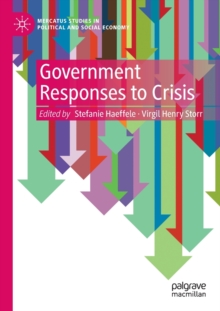Description
| Product ID: | 9783030393083 |
| Product Form: | Paperback / softback |
| Country of Manufacture: | GB |
| Series: | Mercatus Studies in Political and Social Economy |
| Title: | Government Responses to Crisis |
| Authors: | Author: Stefanie Haeffele, Virgil Henry Storr |
| Page Count: | 145 |
| Subjects: | Peace studies and conflict resolution, Peace studies & conflict resolution, Public administration, Development economics and emerging economies, Popular economics, Public administration, Development economics & emerging economies, Popular economics |
| Description: | When crises occur, citizens, media and policymakers alike expect government to respond and to take a leading role in recovery. Given the scale and scope of crises, whether natural (such as hurricanes, floods, and earthquakes), manmade (such as conflict and economic downturns), or often a combination of the two, governments are often seen as being in the best position to identify the problems, understand the circumstances, and direct action. They are also likely to be the entities that have adequate resources to devote to such large-scale efforts. Yet, governments are not spared from the effects of crises. They are composed of individuals who are impacted by disasters and face many of the same challenges in identifying needs, prioritizing action, and adjusting to changing circumstances. It is by no surprise that governments are also often scrutinized during and after crises. How, then, do we understand the capability of and proper role for governments to respond to crisis and to drive recovery?This edited volume—comprised of chapters by accomplished scholars and seasoned practitioners in disaster and crises studies and management, spanning multiple disciplines including sociology, economics, and public administration—examines the roles, expectations, and capabilities of government responses to crises. It gives an overview of the literature, provides lessons learned from both research and experience on the ground during crises, and puts forth a framework for understanding crisis management and subsequent policy implications. It will be of use to any scholars, students, practitioners or policymakers interested in learning from and better preparing for crises and responding when they do occur. When crises occur, citizens, media and policymakers alike expect government to respond and to take a leading role in recovery. Given the scale and scope of crises, whether natural (such as hurricanes, floods, and earthquakes), manmade (such as conflict and economic downturns), or often a combination of the two, governments are often seen as being in the best position to identify the problems, understand the circumstances, and direct action. They are also likely to be the entities that have adequate resources to devote to such large-scale efforts. Yet, governments are not spared from the effects of crises. They are composed of individuals who are impacted by disasters and face many of the same challenges in identifying needs, prioritizing action, and adjusting to changing circumstances. It is by no surprise that governments are also often scrutinized during and after crises. How, then, do we understand the capability of and proper role for governments to respond to crisis and to drive recovery?This edited volume-comprised of chapters by accomplished scholars and seasoned practitioners in disaster and crises studies and management, spanning multiple disciplines including sociology, economics, and public administration-examines the roles, expectations, and capabilities of government responses to crises. It gives an overview of the literature, provides lessons learned from both research and experience on the ground during crises, and puts forth a framework for understanding crisis management and subsequent policy implications. It will be of use to any scholars, students, practitioners or policymakers interested in learning from and better preparing for crises and responding when they do occur. |
| Imprint Name: | Springer Nature Switzerland AG |
| Publisher Name: | Springer Nature Switzerland AG |
| Country of Publication: | GB |
| Publishing Date: | 2020-03-26 |


